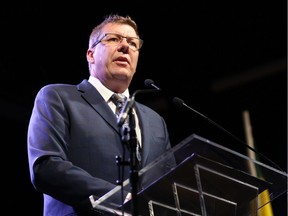‘There’s a lot of polarization over the issue between the cities and rural Saskatchewan,’ said McGilp.
Article content
OTTAWA — Voters in Saskatchewan and New Brunswick are preparing to vote in fall elections and a new poll suggests that new rules on pronouns in schools brought in by governments in both provinces will be top of mind.
Two-thirds of Saskatchewan voters say that the province’s law on parental notification and consent for student pronoun and name changes will impact how they vote in the province’s upcoming election, according to a new poll.
Advertisement 2
Article content
Sixty-eight per cent of respondents said the school pronouns law will impact their vote “a lot” or “some,” in a poll of 596 likely voters taken by Saskatoon-based Insightrix Research.
The online poll was conducted between July 23 and 26, using a representative sample drawn from all regions of the province.
Supporters of the opposition NDP are most galvanized by the signature legislation, with 72 per cent saying it will impact the way they vote in this fall’s election. 64 per cent of those who favour the incumbent Saskatchewan Party say the law will affect how they vote.
The election will be held on or before October 28.
Respondents ranked school pronouns as the least important of four election issues, behind the provincial government’s withholding of the carbon tax from energy bills, the government’s handling of this year’s teachers’ strike and the recent conduct of a number of SaskParty MLAs in the province’s legislature.
However, voters felt strongly about the issue compared to the others mentioned in the survey. 49 per cent of respondents said the pronouns law will have “a lot” of sway over how they vote, putting it second behind the carbon tax withholdings in terms of intensity.
Article content
Advertisement 3
Article content
Lang McGilp, research director at Insightrix, said that Premier Scott Moe raised the temperature on the issue when he pre-emptively tacked the notwithstanding clause onto the school pronouns law, also known as the Parents’ Bill of Rights.
“It struck a lot of people as excessive to invoke the clause over such a narrow issue,” McGilp told the National Post, adding that Moe’s use of the notwithstanding clause was especially off-putting to urban voters in Regina and Saskatoon.
“There’s a lot of polarization over the issue between the cities and rural Saskatchewan,” said McGilp.
If recent “culture wars” elections south of the border are any indication, the pronouns issue could drive Gen Z voters, born in the late 1990s and early 2000s, to the polls in higher than usual numbers.
One in six gen Z Canadians identify as LBGT, according to an Ipsos study published last summer, which is by far the largest proportion among any generational cohort.
Insightrix currently has the NDP leading the SaskParty by a whopping 27 points among voters under the age of 35 and up by one point among all decided voters.
Advertisement 4
Article content
Polls show that support for the Saskatchewan NDP has been growing steadily since around last September. And while this uptick coincides with the introduction of the pronoun law, McGilp was quick to caution against equating correlation with causation.
He noted that the major hurdle for the Saskatchewan Party will be voter fatigue over its 17 years in power, which is by far the longest run for any governing party in Canada. Over half of respondents in Saskatchewan say they want change.
Saskatchewan isn’t the only province where pronouns will be debated at the polls this fall. New Brunswick’s provincial election is also expected for October, with the 21st of the month being the last possible day the vote can take place.
New Brunswick’s Progressive Conservative government set off a national debate over school pronouns last summer with controversial changes to its sexual orientation and gender identity guidelines for schools, known as Policy 713.
New Brunswick Premier Blaine Higgs has been a highly visible supporter of Policy 713, regularly appearing on political talk shows to defend the contentious guidelines.
Advertisement 5
Article content
Polls have Higgs’ PC’s neck-and-neck with the New Brunswick Liberal Party heading into the fall.
The pronouns issue will draw a good deal of Canada-wide interest to the elections in Saskatchewan and New Brunswick, two small provinces that are used to flying under the national radar.
The two elections will be watched especially closely in Alberta, where the province’s United Conservative Party Government is expected to introduce its own legislation on parental notification and consent for student name and pronoun changes in the fall legislative sitting.
McGilp says he’s already seeing an uptick in media inquiries compared to previous election cycles.
“Recent provincial elections have been rather uneventful,” said McGilp. “That certainly won’t be the case this time.”
National Post
rmohamed@postmedia.com
Get more deep-dive National Post political coverage and analysis in your inbox with the Political Hack newsletter, where Ottawa bureau chief Stuart Thomson and political analyst Tasha Kheiriddin get at what’s really going on behind the scenes on Parliament Hill every Wednesday and Friday, exclusively for subscribers. Sign up here.
Our website is the place for the latest breaking news, exclusive scoops, longreads and provocative commentary. Please bookmark nationalpost.com and sign up for our daily newsletter, Posted, here.
Article content






